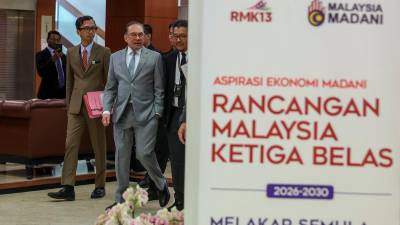CONSIDERING the challenging times we live in, a superstitious person would have probably suggested numbering the coming Malaysia Plan as 12a, just to avoid attracting bad luck.
Jokes aside, the recently introduced 13th Malaysia Plan (13MP) offers all the right solutions for the country as we navigate through these choppy waters.
In identifying the plan’s key objectives, choosing the word resilience is an apt one. It implies sustainability for any state that can be economically agile, able to adapt quickly and effectively to a fast-changing environment, and is likely to outlast those that are not.
Likewise, a country that emphasises upward social mobility for all and the well-being of its people will foster the loyalty needed to go the distance as time progresses.
These would not be possible if the public service proves to be a hindrance than a facilitator; hence the need to push through its reform. Nothing elicits trust more than an organisation that works for the people it is designed to serve. And trust is important especially when facing challenges that require collective perseverance.
The selection of the 27 priority areas reflects a well-balanced mix of current and future concerns. The plan aims to boost growth in high-growth high-value (HGHV) industries and high-impact strategic sectors while also emphasising sustainability by strengthening and empowering the blue and green economies. This cannot be achieved without strengthening the R&D&C&I (research, development, commercialisation and innovation) ecosystem.
While the devil is in the details, the plan clearly reflects the government’s commitment to restructuring the economy towards a more advanced and greener model, in line with its promises under the Madani Economic Framework.
Holistic approaches have been identified to facilitate the transition towards greener and cleaner energy, including the possible use of nuclear energy. But there is also no doubt that these measures, particularly in relation to developing HGHV sectors and strengthening the R&D&C&I ecosystem, are responses to possible global disruption, brought about by ongoing dynamic geopolitical and geoeconomic developments.
The 13MP’s focus on strengthening Malaysia’s digital ecosystem as well as in AI, blockchain and robotics technology must be viewed in this light.
We are in another industrial revolution, and as history has often taught us, those that can compete – if not lead – are likely to have a front row seat in the new world that emerges. It is high time for countries like Malaysia to be technology creators not just consumers.
To support this, at least in the context of AI, the government will develop an AI-driven ecosystem through the National AI Action Plan 2030.
According to the plan, this will drive talent development and R&D&C&I to accelerate the adoption of AI.
The plan also addresses many of the concerns facing Malaysians today such as food security, public transport, quality of education, healthcare, availability of housing and employment. This is not only the case of providing quality living for the present but also for the future, especially as we shift towards an ageing society – and bringing with it its own set of problems.
With 12 states now categorised as ageing, plans to introduce legislation to regulate long term care services as well as establish a one-stop centre to develop tech-based solutions for the elderly will certainly be welcomed.
Staying true to the spirit of Malaysia Madani, inclusiveness continues to be emphasised in the 13MP. In attempting not only to address the socioeconomic disparities that exist between its citizens, the government will also continue to ensure no region gets left behind.
With the proposed star rating system in place to promote and sustain women’s participation in the workforce, the empowerment of women takes a positive step forward.
Public sector reform continues to be the focus of the current administration. Among the measures identified to further achieve this goal is to accelerate the digitisation of services and work processes through AI adoption.
Keeping its commitments to reform projects and fiscal reform, a new mechanism to manage development expenditure will be introduced under the plan.
13MP has received positive feedback from many quarters. It is now up to the government machinery to see to its implementation.
As it is often said, a plan however brilliant can be ruined by poor execution but an average plan executed well can succeed.
Dr Peter Brian M. Wang is the deputy head of the Centre of Economics and Public Finance at the National Institute of Public Administration. Comments: letters@thesundaily.com
